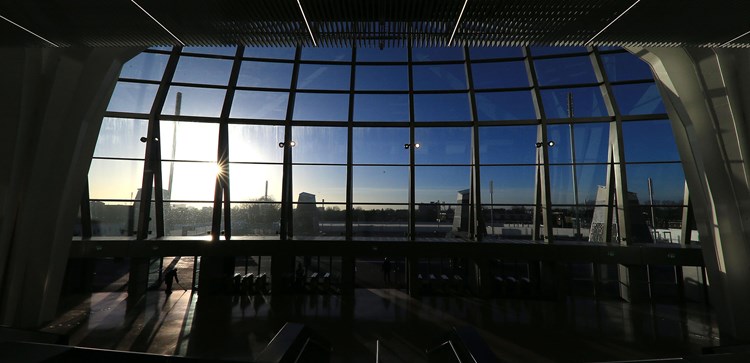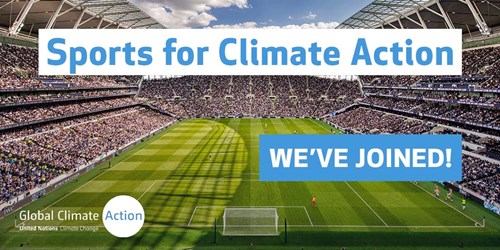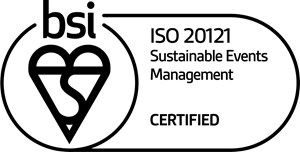
Passionate About Our Planet
To Care Is To Do
Tottenham Hotspur is dedicated to minimising the environmental impacts of its activities across all Club operations.
We embrace initiatives and technologies that reduce our environmental impact whenever possible, working towards improving efficiency and sustainability across the Club at all levels - encouraging employees, suppliers and partners to do the same.
We are offsetting our carbon footprint in a myriad of different ways – to date, we have planted hundreds of new and semi-mature trees and tens of thousands of new plants, hedges and flowers across our Training Centre to establish an ecological habitat
The Club was a founder member of the 10:10 initiative, which called on individuals, businesses, schools and other organisations to cut their emissions by 10% in a year. This founder membership and the Club’s work during that period has informed our policies moving forward since implementation in 2009.
The Club’s core policies are:
- Recycle any waste products generated across the Club where possible and increase waste diversion away from landfill
- Reduce our single-use plastic footprint with the aim of eliminating its use across Club operations, seeking to source more environmentally sustainable materials where possible
- Educate and inspire young people in our communities through the work of the Tottenham Hotspur Foundation
- Promote alternative forms of transport for fans and staff to and from the stadium and Training Centre that have a reduced impact on the environment
- Identify locally and sustainably sourced food options to cater for various dietary requirements, including plant-based food options, at our stadium
UN Sports for Climate Action Framework - Race to Zero

Tottenham Hotspur has proudly joined the UN Race to Zero, committing to halve its carbon emissions by 2030 and become net zero carbon by 2040.
It follows the Club becoming a signatory of the UN Sports for Climate Action Framework, which supports and guides sports organisations globally to achieve climate change goals, in January 2021.
The Race to Zero high ambition track was launched at last year’s COP26 and aims to rally non-state actors – including companies, cities, regions, financial and educational institutions – to take rigorous and immediate action to work towards achieving net zero carbon in line with the Paris Agreement, with transparent action plans and robust targets.
The Sports for Climate Action initiative calls on sporting organisations to acknowledge the contribution of the sports sector to climate change and a collective responsibility to strive towards climate neutrality for a safer planet.
By signing the Framework, the Club has demonstrated its commitment to playing its part to ensure the sports sector is on the path to a low-carbon future.
In line with the five core principles enshrined in the Framework and the aims of the Paris Agreement, signatories strive to:
- promote greater environmental responsibility;
- reduce the overall climate impact from sports;
- use their platforms to educate for climate action;
- promote sustainable and responsible consumption; and
- advocate for climate action through communications.
Until recently, most companies have focused on measuring emissions from their own operations and electricity consumption (Scope 1 and 2). Scope 3 accounts for the greenhouse gas (GHG) emissions associated with a company’s entire value chain. These are considered indirect emissions as are not under the company’s direct control.
Scope 3 emissions are broken down into 15 categories which span the entire upstream and downstream activities of a company. Scope 3 emissions often account for 80% - 99% of a company’s total emissions footprint and it is therefore important to understand these emissions. Assessing the entire value chain emissions impact can help to identify where to focus reduction activities.
Tottenham Hotspur has calculated its full emissions footprint for a third year, covering our full Scope 1, 2 and 3 emissions. Given the wider, increased operations, total market-based greenhouse gas emissions for our most recent reporting period, FY24 (1st July 2023 – 30th June 2024), totalled 94,056. This represents a 5% increase from FY23 and a 17% increase from our FY22 baseline, due to an increased number of events held at the stadium in this period and continued construction and IT infrastructure works across our facilities as part of a wider regeneration programme being delivered in North Tottenham, bringing enhanced social benefits locally.
The Club has made significant progress in reducing Scope 1 and 2 emissions. Since our FY22 baseline, Scope 1 emissions have decreased by over 37%, driven by a decrease in natural gas consumption as we continue to unlock operational energy optimisation. Scope 2 emissions are tracked using a market-based approach and are subsequently zero, reflecting the purchase of REGO-backed energy supplies.
Tottenham Hotspur is committed to tackling Scope 3 emissions, as a signatory to the UN’s Sports for Climate Action Framework, and is working with suppliers to capture more accurate data and move away from a spend-based approach, where possible. In FY24, we have adjusted how we report on fan travel emissions - to align with new UEFA recommendations and guidelines, the associated emissions have been moved from Category 9 (downstream transportation and distribution) and reported as additional Scope 3 emissions.
|
Emissions Scope and Scope 3 Category |
June 2023 - July 2024 |
|
Scope 1 |
2,203 |
|
Gas |
2,105 |
|
Transport (excluding grey fleet) |
82 |
|
Other fuels |
15 |
|
Scope 2 (location-based) |
4,734 |
|
Scope 2 (market-based) |
0 |
|
Scope 3 |
91,853 |
|
1: Purchased Goods and Services |
29,844 |
|
2. Capital goods |
13,544 |
|
3. Fuel-related emissions |
1,924 |
|
4. Upstream Transportation and Distribution |
474 |
|
5. Waste generated in operations |
22 |
|
6. Business travel |
1,762 |
|
7. Employee commuting |
1,869 |
|
8. Upstream leased assets |
Not Applicable |
|
9. Downstream Transportation and Distribution |
Not Applicable |
|
10. Processing of sold products |
Not Applicable |
|
11. Use of sold products |
7 |
|
12. End of life treatment of sold products |
51 |
|
13. Downstream leased assets |
1,082 |
|
14. Franchises |
Not Applicable |
|
15. Investments |
Not Applicable |
|
Additional Scope 3 emissions (Fan Travel) |
41,272 |
|
Total All Scopes (location-based) |
98,790 |
|
Total All Scopes (market-based) |
94,056 |
We are working to reduce our Scope 1, 2 and 3 emissions on an absolute basis as far as possible towards an ultimate goal of being net-zero by 2040. On the journey to net-zero we plan to take responsibility for emissions we haven’t prevented from being produced. The Club’s carbon reduction plan can be found here.
ISO20121 Standard

The Club is proud to have achieved certification by BSI to ISO 20121, a standard for sustainable event management – representing a key milestone on the Club’s journey to net zero by 2040.
ISO 20121 is a beacon for sustainable event management, guiding organisations to seamlessly integrate sustainability into every facet of their event planning and execution.
Following a full assessment by BSI – with a focus on social, economic and environmental impacts – Tottenham Hotspur achieved certification to the standard, which is now embedded within Club operations to further foster a holistic approach to sustainability.
The successful certification brings the club in line with COP28, the G7, London Olympics, Tokyo Olympics, the IMF and other large global events.
British Association for Sustainable Sport

The Club is a proud member of the British Association for Sustainable Sport (BASIS), the sustainability hub for sport in the UK.
For more than a decade, BASIS has driven the growth in understanding, expertise and commitment on sustainability in sport, helping members to shape and achieve their sustainability goals and deliver a positive environmental impact through sport.
Through our BASIS membership, we join a host of leading clubs and governing bodies in securing a place in the top tier of sustainability in sport.
Products of Change (POC)

Tottenham Hotspur is the first sports team to become a member of Products of Change (POC). POC is a global educational hub aimed at driving sustainable change across consumer product markets and beyond.
Products of Change brings together a strong community of brand owners, retailers, content creators, innovators, manufacturing partners and marketing experts who by learning and connecting through the platform can drive sustainable change within their respective businesses while maintaining a commercial footing.
Products of Change now has over 250 members, including Mattel, Hasbro, Lego, Viacom CBS, Discovery Networks, BBC Studios, Asda, Tesco’s, and many more leading names. For more information, please visit: www.productsofchange.com
Recycling - use the right bin
The Club is proud of its waste management policy that ensures zero waste is sent to landfill.
You can help us ensure all waste is recycled by simply choosing the right bin when you dispose of your rubbish.
Throughout the concourses, you will find two different bins at each location – one is for General Waste, the other for Dry Mixed Recycling.
The only waste items that should be placed in the Dry Mixed Recycling bins are as follows:
- Empty plastic and glass bottles
- Empty cans
- Paper
- Small cardboard
These items should not contain any left-over food or liquids if being placed into the Dry Mixed Recycling bin.
All other waste, such as left-over food, should be placed in the General Waste bin – this is crucial for the following reason:
After matches, the Dry Mixed Recycling bins are taken to a nearby Material Recovery Facility in Edmonton where the waste is separated to produce quality, single-stream materials that are then baled and sent to the most sustainable companies for re-processing.
However, if we contaminate our Dry Mixed Recycling bins with General Waste, it makes this sorting and repurposing process impossible.
Therefore, by using the right bin, you will be making the stadium a more sustainable venue by aiding recycling.
To ensure we make this process as simple as possible, we have staff on hand nearby the bins to help you use the right ones.
A full site waste-management plan has been developed for the Training Centre, which includes a green-waste recycling facility nearby.
Food remaining from events is given to The Felix Project charity for distribution locally, reducing food waste.
A full site waste-management plan has been developed for the Training Centre, which includes a green-waste recycling facility nearby
Food remaining from events is given to The Felix Project charity for distribution locally, reducing food waste
Single-use plastics
We are leading the way in exploring ways to ensure that products we use do not end their life with us as part of our commitment to reducing our single-use plastic footprint across Club operations.
We have sought to source more environmentally sustainable alternatives to single-use plastic and will continue to do so as part of our commitment to phasing out single-use plastics from our operations. Any new contracts which come up for tender will also include a requirement to cut single-use plastics.
- We have implemented a reusable cup scheme - OnePlanet cups - throughout General Admission areas, to reduce our single-use plastic consumption, saving over 1.25 million cups per year. Mounted to our recycling bin units throughout the concourses, you will notice bespoke units where cups are to be disposed of after you have finished your drink. Cups are collected and taken off site after matches to be washed and then returned for further use.
- Tottenham Hotspur Stadium is the first in the UK to use an industry leading ‘Keg Cap Collection Service.’ As part of the full management service offered by Reusable Cup Company, all used keg caps are collected with dirty reusable cups after every match. These caps are taken to a cup production plant and recycled into brand new products, such as parts for the building trade or even new keg caps themselves, reducing the stadium’s draught dispense single-use waste plastic by over 100kg’s per season. Cups at the end of their life will also be recycled into new products - one cup contains enough plastic to make six new keg cap.
- Where possible, we have switched our disposables within the stadium to a seaweed coated type of disposable that is plastic free, unlike most in the market. Fully compostable and recyclable, this switch over is part of our single-use plastic reduction strategy. Through this switch we have avoided using 336kg of plastic, and saved 3770.6kg CO2e (39% reduction from March 2024 to March 2025).
- On a matchday, and across our visitor attractions, we have removed the use of condiment sachets, utilising condiment pumps, which allows us to remove the need for single use sachets. This is the same for our salt, pepper, and vinegar sachets.
- We do not stock plastic straws, stirrers or cutlery at the stadium across all concourse areas, nor are they wrapped in any plastic disposable packaging. We instead use wooden stirrers and cutlery, and paper straws. In addition, no single-use plastics is used to serve food inside our premium areas. Sandwich packaging in The M, our new food and drink option on the High Road, is fully compostable.
- Players drink water from cartons as opposed to plastic bottles at all home matches, with refillable bottles provided by O.R.S used during training sessions.
- The Nike shirts that players wear on the pitch and the replica jerseys for fans to buy are constructed with 100% recycled polyester fabric, which is made from recycled plastic bottles.
- Water fountains are available throughout our general admission concourses.
- Stadium visitors are able to purchase a multi-use, reusable drawstring bag from one of our retails outlets at a cost of £1.
- Fans are able to purchase from our range of Retro Hangers, which are eco-friendly and 100% plastic-free, made from a revolutionary FSC-certified cellulose-based material.
Clean/renewable energy
Tottenham Hotspur has been recognised as a European winner in the annual 2024 Sustainability Impact Awards by Schneider Electric, the Club’s Official Energy Management Provider. The Club uses 100% renewable electricity, across all sites, backed by REGO certificates
Other aspects of the building design include insulation, solar shading and building fabric thermal performance that reduce the need for additional energy usage.
Carbon dioxide emissions from the Stadium are around 50% less than a stadium built 10 years ago and the entire development is targeting a 22% improvement on the Building Regulations baseline.
The Club has put technologies in place throughout its Training Centre to deliver renewable energy to the development, including 75m2 Solar Panels and air source heat pumps.
Energy efficiency
The building fabric of the stadium has been designed to be highly insulated to reduce heating and cooling demands.
Our stadium’s technology infrastructure, developed in partnership with HPE and Aruba, allows for the consumption of less power during periods of low activity.
LED lighting (including floodlights) and high-efficiency building services systems are in place to reduce energy use.
A range of other initiatives are in place including intelligent controls, attenuation water tanks and green roofs on the Tottenham Experience.
Sustainable Transport
The Club has a sustainable transport plan in place for both its fans and staff, overseen by an appointed Travel Plan Co-Ordinator.
Tottenham Hotspur Stadium is a Public Transport Destination, with service improvements, new shuttle bus and regional coach services, better pedestrian connections, real-time travel information points, clear signage and regular transport updates on the Club’s website, in matchday programmes and directly to fans from several sources.
The Club has a target of no more than 23% of supporters (i.e. 14,250) travelling by private car on matchdays. This is a reduction from 62.5% of supporters who travelled to our old Stadium, White Hart Lane, by private car. The Club surveys match attendees after every home game to understand how they travelled and inform our transport planning.
The Club has installed new bike racks locally around the stadium and is actively encouraging fans to consider cycling on matchdays.
The Club has launched a 'Cycle To Work' scheme for staff in conjunction with Cycle Solutions, with additional bike tacks installed at its offices.
Charging stations for electric vehicles are available across Club sites.
TEAM TRAVEL
The Club works with its Official Travel Partner, Destination Sport Travel, to measure, manage and report on team travel emissions, with the objective to reduce emissions where possible and identify sustainable team travel options. Destination Sport Travel is also working with the Club to offset emissions where possible via the purchase of carbon credits verified by the UN Framework Convention on Climate Change.
Tottenham Hotspur is committed to minimising its environmental impact across all Club operations, which will take time and effort. As part of this commitment, and as a signatory of the UN Sports for Climate Action Framework, the Club has a policy in place to ensure all its playing teams – comprising of the Men’s First Team, Women’s First Team and Academy age groups – travel to and from matches as sustainably as possible.
This includes minimising air travel where possible, with team officials and delegates travelling on the team plane where space permits. During the season, the team will travel by coach for all distances under 2.5 hours, whereby player physical optimisation and performance is not compromised as a result.
Water Use
Water consumption is minimised across the stadium with waterless urinals and low-flow fittings and fixtures.
Since FY2021/2022, our baseline year for carbon reporting, we have reduced our irrigation consumption at the stadium by 57%, using advanced monitoring systems and a dedicated grounds team.
At the Training Centre, a sedum ‘green roof’ has been installed to significant portions of the main building to enable the capture and re-harvesting of rain water across the site.
A comprehensive drainage and extraction system is in place through the installation of an attenuation pond and two onsite bore holes that extract water, with licences and agreement from the Environment Agency.
Food & Beverage
The Stadium’s food strategy actively promotes a plant-forward approach in our menu designs, whilst encouraging plant-based and vegetarian options. Where products contain animal based ingredients, we promote a plant-forward approach, in which plant ingredients such as vegetables, legumes and grains are included in recipes to reduce the proportion of meat and therefore carbon impact - this is seen with our N17 Burger, in which we use our signature 50:50 burger – which for a 120g patty has a 33% emissions reduction compared to a standard beef burger.
In 2024 we introduced a 100% plant-based/ vegetarian kiosk - The Greenhouse - for our concerts, with the success from this meaning we will be reintroducing it across multiple kiosks during the 2025 concert season. 84%, the equivalent of 9,500 desserts, on a matchday are plant-based, in which our Pastry team work hard to create classic and modern desserts, redesigned with plant-based egg/ dairy alternatives.
THE PIE ROOM
We have our own in house 'Pie Room' in which all our sausage rolls and signature pies, across matchday and event days in premium and retail, are produced within the stadium. This equates to 4,000 of each produced for each matchday in Retail.
CARBON LABELLING
We have implemented carbon labelling on our menus at the Tottenham Hotspur Stadium. GHG emissions of food products have been calculated in a cradle-to-grave approach, across the complete life-cycle – from farm, to packaging, to transport and food waste. This allows our chefs to make climate-friendly changes when designing menus and encourages our guests to choose dishes with a lower climate impact. Food items are ranked according to their carbon intensity – we use A and B carbon labelling symbols on our menus to showcase those dishes that have a particularly low climate impact, to promote and highlight these products, whilst being amongst a selection of dishes all designed with a climate-conscious and plant-forward approach. This labelling can be found across our Retail screens and Premium Menus on an event day.
OUR SUPPLIERS
With a focus on local and seasonal produce, 80% of our suppliers are within a 50-mile radius of the stadium. This includes Wicks Manor Farm which supply our pork products and is less than 55 miles from the stadium, and Paul Rhodes who supply fresh bakery items such as pastries and fresh bread, daily.
Sports for Nature
In 2025, we became the first Premier League Club to join the UN-backed Sports for Nature Framework. Sports for Nature is a joint initiative of the International Union for Conservation of Nature (IUCN), International Olympic Committee (IOC), United Nations Environment Programme (UNEP), the Secretariat of the Convention on Biological Diversity (CBD) and Dona Bertarelli Philanthropy.
It aims to deliver transformative action for nature across sports, by 2030 and beyond, enabling sports to champion nature and contribute to its protection and restoration. It provides a game plan for sports — at all levels — to accelerate and inspire others to take action for nature.
By joining the Framework, we have committed to:
- Protecting nature and avoiding damage to natural habitats and species
- Restoring and regenerating nature wherever possible
- Understanding and reducing risks to nature in our supply chains
- Educating and inspiring positive action for nature across and beyond sport
A detailed Ecological Management Plan is in place across all Club sites to monitor and manage ecological activity.
STADIUM
A detailed ecological survey of the stadium site was undertaken to establish baseline conditions ahead of its construction.
The site is largely occupied by buildings, bare ground and hard standing with limited areas of amenity grassland and scattered semi-mature/mature trees. Buildings and trees typically provide shelter and breeding opportunities for bats and birds and therefore surveys for both species groups have been completed.
Previous bat transect surveys undertaken by CSa Environmental Planning in 2008 confirmed low levels of bat activity in association with the site and found no evidence to suggest that bats roost at the site. Based on the survey findings, the local bat population is not considered to be a Valued Ecological Receptor (VER).
A nesting bird survey undertaken in 2014 recorded kestrel (amber-listed Bird of Conservation Concern) and starling (red-listed Bird of Conservation Concern) nests on site. Both species are well adapted to urban environment and therefore are not considered to be at risk of adverse effects resulting from the stadium project. Nesting birds are not considered to be a VER as part of this assessment.
Two internationally important wildlife sites (a Ramsar site and a Special Area of Conservation) and two nationally important wildlife site (both Sites of Special Scientific Interest) were identified as VERs, alongside two Sites of Importance for Nature Conservation. No significant effects to any of these sites were anticipated in relation to the stadium.
A range of roosting/nesting features are provided at the stadium in order to increase the ecological value of the site. These benefit a range of locally important species including bats, kestrels, starlings, swifts and a range of other bird species commonly found in urban environments.
TRAINING CENTRE
The Club has planted hundreds of new and semi-mature trees and tens of thousands of new plants, hedges and flowers across its Training Centre, as well as a Wildflower Meadow, to establish the ecological habitat.
In our conservation area at the Training Centre, we have also created two additional wildlife ponds, 25 bug hotels and multiple bat houses. The attenuation pond has also been enhanced to not only fulfil its practical application, but the creation of a natural wetland and intermittent wetland habitat with additional ponds and wildlife.
Further ecological measures at our Player Accommodation Lodge include:
- Additional terrestrial habitats created to promote biodiversity
- Aquatic habitat created for protected species of Great Crested Newts
- Considerate lighting to reduce light pollution to promote existing bat species proliferation
- Barn and Farmhouse built to house bats
- Local well used for maintenance and irrigation of the grounds
- Green roof designed to propagate local fauna, birds and wildlife
- Preservation of several trees of high importance
- Wildlife corridor created - an exclusion zone for guests
- 75 additional species of plant have been added to the site’s ecology
The site is evaluated under Greenspace Information for Greater London, Multi-Agency Geographic Information for the Countryside, and the National Biodiversity Network Gateway.
The Club works with two biodiversity monitoring systems in first of its kind collaborations for a sports organisation.
As part of our ongoing sustainability efforts, the advanced monitoring systems, which monitor pollination and bird activity, allow the Club to collect crucial data to provide insight into current biodiversity levels and also compare species diversity across different years and locations at our sites. Specific benefits of the systems include:
- Measuring species diversity and activity levels between all habitats
- Comparing biodiversity between different habitats to identify best practices
- Demonstrating the beneficial impact of our environmental initiatives
- Using data to showcase the work we are doing to improve biodiversity levels
- Aiding in the strategic planning and design of future projects and site expansions








